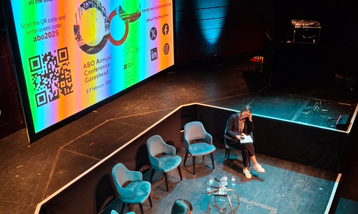Blog: Tony Stoller shares the achievements and challenges of his term as chair
NewsNews Story
Our former Chair, Tony Stoller, reflects on the work that trustees and staff have achieved together and where the organisation sits today.
As I come towards the end of my time as the chair of the Board of Trustees of Orchestras Live, completing my second term, I look back with pleasure and some amazement at all that has been achieved by the organisation over the past 6 years. Of course the Chair and the Trustees are not those who actively achieve all the developing work across England which has been the hallmark of Orchestras Live, but our role in facilitating and providing accountability for that work is one in which we have taken pride.
It has not been the easiest of times. The coronavirus pandemic and the imposition of lockdown placed unprecedented strains upon the orchestral sector. The cost of living crisis has been a challenge for us and those working in the orchestral sector, as for so many people and organisations. Our partners have been under huge pressure, both practical and financial, and individual musicians have endured probably the hardest time. That almost all have managed to survive the crisis and are able again to provide the essential cultural underpinning of our society which orchestral music represents, is a tribute to their determination, professionalism and commitment.
For Orchestras Live, there have been a series of challenges. As for all the organisations within the sector as a whole, we have had to look very hard at our expenditure and our sources of funding, working with partners who themselves have been under similar pressures. Our organisation remains in robust health, and we are grateful to our partners and supporters, including Arts Council England, for their continued commitment to our work and its future development. We have the confidence to move forward now into new ventures, as well as sustaining our work of nearly 60 years in ensuring the availability of high quality orchestral music in localities which have previously been underserved, and to communities who may have felt themselves excluded.
Our new directions draw upon many of the lessons learned during the pandemic. Perhaps foremost among those has been and continues to be embracing the role of digital activities in reaching individuals and communities and bringing them together with orchestras and educational initiatives. In rethinking the nature of live performance we have become increasingly able to tour our digital productions, such as the successful and evolving Breathe project with the Manchester Camerata.
We have also been able to strengthen and increase our regional presence. As far back as 2020 we relocated our main base to Duke Studios in Leeds, in keeping with our long-standing focus on activities away from London. We now have Creative Producers based in the East of England, the North of England and the Midlands. We have rethought our regional structure, appointing Community Impact Coordinators who are already showing how much more we can still achieve in existing and new localities.
An important current topic is the relationship between music and well-being. Prompted by a session on orchestras and healthcare at the Association of British Orchestras conference in 2020, we co-authored – along with the ABO and the City of London Sinfonia – a report on the potential of this area of activity and what has been achieved so far. For the first time we now have a comprehensive picture of orchestras’ health and well-being work that illustrates social impact and societal relevance. We look forward to developing further our work with orchestras in this important field.
A continuing theme throughout the past years has been our emphasis on diversity, inclusivity and relevance among partners with whom we work, the audiences that they seek to address and among our own staff and trustees. With support from partners, including Black Lives in Music, Sound and Music’s Fair Access Principles and I’M IN, we have examined our own internal processes and worked to embed inclusive practice across our systems. Whilst this is still work in progress, it has improved our understanding of the issues and enabled us to collaborate more effectively with community and artistic partners to achieve positive change.
Flagship projects such as Able Orchestra, for whom we commissioned a new work by Oliver Vibrans to open the 2020 ABO Conference, play an important role in influencing the sector to rethink what an orchestra can look and sound like. We hope to play a comparable role in moving forward the debate around decolonising the orchestral music canon.

Able Orchestra performing in Mansfield with BBC Concert Orchestra.
Credit: Reg CleggLooking ahead, Orchestras Live intends to diversify its income streams. We will be giving particular attention to providing the experience we have gained, and the successful projects we have undertaken, by way of consultancy as part of our business development within the sector as a whole. I have enjoyed a compelling, challenging and thoroughly enjoyable 6 years as the Chair of Orchestras Live. I wish my successor an equally meaningful time.



